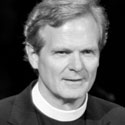
Trinity Church has a deep connection to the Boston Marathon—it hovers over the finish line in Copley Square. Every year on the Sunday before the race, runners come to the 143-year-old church. This past Sunday, Lloyd, 63, welcomed nearly 100 runners to altar and prayed for them. He says he always tells them, “You may think the church is beautiful now, but the next time you see it, it will look like the Kingdom of God when you are coming in your exhausted state.” Then, in Trinity Church Marathon Sunday tradition, everyone exited to the postlude of Chariots of Fire.
On Monday, the church became part of the bombing crime scene and no one has been allowed to enter, much less worship. Lloyd, who previously was the dean of the National Cathedral in Washington, hopes they will be able to open their doors again for services this Sunday.
Monday was a great spring day, with the celebratory nature of the Marathon, and Red Sox in town, and Boston being Boston at its best. Then this shattering thing happened. It is clear that the work of terrorists is the work of trying to undermine people’s confidence and security. Their goal is to make people frightened and make them reactive and concerned about their safety, feeling vulnerable. While Bostonians are very strong, resilient people, there still is something that has shaken them. Some of it is probably an echo of how vulnerable we felt after 9/11, some of it is a sense of the appalling terrorism we watch on our television screens in Middle Eastern cities, all the sudden that is happening in the center of the back bay of Boston. What is our answer to the terrorists?
The Biblical text for this Sunday in most denominations is Jesus’ words, “I am the good shepherd who cares for his sheep” and the psalm is Psalm 23, “The Lord is my shepherd, I shall not want.” I may preach on the 23rd Psalm as the best antidote we have to this attempt to scare us into being people we don’t want to be. I was at the interfaith service Thursday with President Obama. A lot of it was reminding Boston of who Bostonians are. They are tough, they are resilient, they also showed their deeply compassionate side—when the explosions went off, they didn’t run away from it, they ran into it to try to help the people who were hurt. Ultimately that comes from a deeper place, a sense that there is a love underneath all this we can trust. Rooting ourselves in that, carrying on our lives as creatively as we can, with acts of mercy love and justice ultimately is the defeat of everything the terrorists are out to do.
We need to name what they were trying to do and name the way that has touched our spirits, and then talk about everything we are gathered to do on a Sunday, to care for each other, to remember the grace and mercy at the heart of everything day by day, and claiming the call to live that here and now. All of that is our answer to the terrorists’ efforts to undermine the fabric of our lives.
